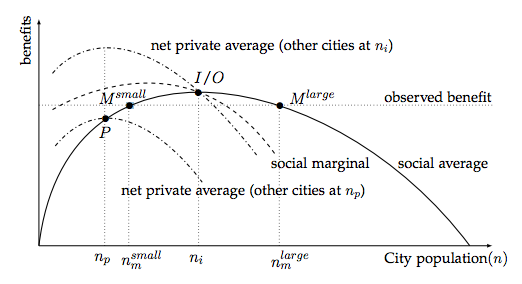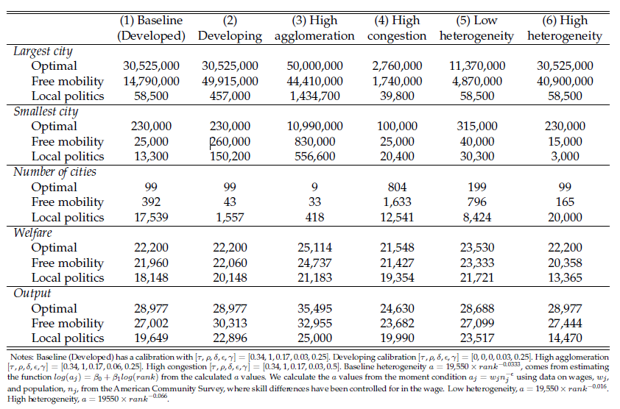 Posted Feb 10, 2017, 6:23 PM
Posted Feb 10, 2017, 6:23 PM
|
 |
Registered User
|
|
Join Date: Aug 2002
Location: Toronto
Posts: 52,200
|
|
|
Are Cities Too Small or Too Big? (Commentary)
Are Cities Too Small or Too Big?
Feb 7, 2017
By RICHARD FLORIDA and ANDREW SMALL
Read More: http://www.citylab.com/housing/2017/...cities/512999/
Quote:
The Electoral College’s bias against American cities has spurred some liberal commentators to suggest that left-leaning urbanites should venture out of their coastal bubble cities and head toward the smaller cities and metros of the heartland and the Sunbelt, where their votes could make much more of a difference. --- But others contend our cities are not big enough. A growing chorus of economists argue that out-of-date zoning and building codes create artificial limits on our biggest and most productive cities, driving up housing costs, and making inequality even worse—at a substantial trillon-dollar-plus cost to the economy as a whole.
- A recent National Bureau of Economic Research working paper by economists David Albouy, Kristian Behrens, Frédéric Robert-Nicoud, and Nathan Seegert frames the issue in terms of a simple question: What is the optimal distribution of U.S. cities? --- You can think of this in terms of two sets of trade-offs. Cities generate costs and benefits. Larger and denser cities benefit us by generating innovation and improving productivity, but they can also be plagued by costs—such as congestion, crime, pollution, and disease. --- Then there is the trade-off between individual versus social benefits. Left to their own devices, people might choose to form and occupy a bunch of small cities geared to their own individual needs and desires. In other words: suburbs. When this happens, individuals do not pay the full cost for inefficient development of lots of small places.
- The study finds that large American cities might in fact be undersized by as much as a third. Furthermore, we may have up to two times as many cities as we need, causing up to half the U.S. urban population to live in places that are too small. --- On the extremes, the study finds, we could end up with as few as nine giant cities, each housing 50 million people, or 20,000 small cities with between 3,000 and 58,500 residents. --- The study generates a wide swath of best- and worst-case scenarios. As a baseline, the authors note that under the “optimal” scenario we would end up with 100 cities that range between 230,000 and 30.5 million people in size; “free mobility” would mean roughly 400 cities of between 25,000 and 15 million people; and “local politics” gives us a whopping 17,500 cities between 13,300 and 58,500 residents.
- The upshot of this exercise: We probably have too many cities. People may want to live in smaller towns and those who live in urban neighborhoods may want to protect themselves against certain kinds of growth or density, but doing so brings substantial costs to the economy as a whole. This does not mean that everyone needs to congregate in a big dense city like Manhattan. --- Behind this thought experiment is a serious consideration: How should we live? Creating a denser and more efficient distribution of cities cannot happen overnight, but this theoretical framework should help steer wonky discussions about zoning, land use, and development toward a more lofty territory.
.....
|
The dotted lines demonstrate the benefit to large and small cities when they constrain their population growth to maximize private gain. The solid curve shows an increased social average benefit when all cities increase their population and consolidate. (Albouy et. al)
 The table below outlines the different possibilities for cities, which play out in wildly different ways. The first is what they call “optimal,” where cities essentially make optimal use of the best locations, extracting the most amount of benefit for the most amount of people with the least amount of cost. --- The second is based on “free mobility,” where individual households make the decisions that best suit them. --- And the third reflects “local politics,” where city sizes reflect local policies and regulations—for example where land use regulations artificially limit the size of cities.
The table below outlines the different possibilities for cities, which play out in wildly different ways. The first is what they call “optimal,” where cities essentially make optimal use of the best locations, extracting the most amount of benefit for the most amount of people with the least amount of cost. --- The second is based on “free mobility,” where individual households make the decisions that best suit them. --- And the third reflects “local politics,” where city sizes reflect local policies and regulations—for example where land use regulations artificially limit the size of cities.

__________________
ASDFGHJK
|



